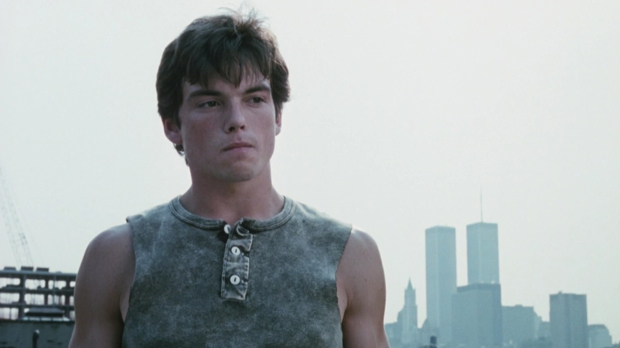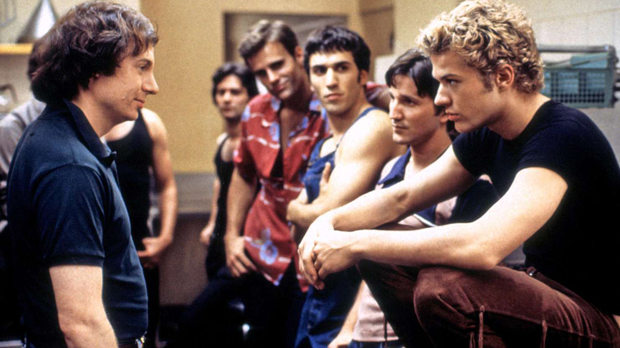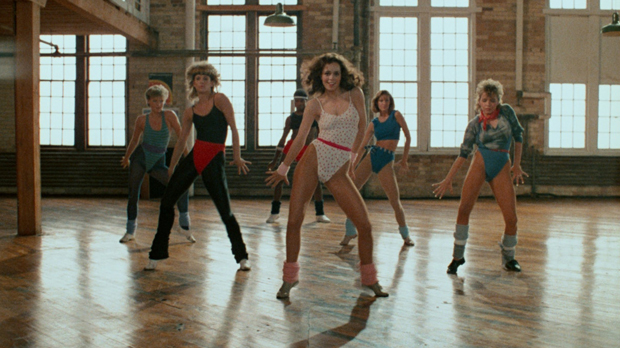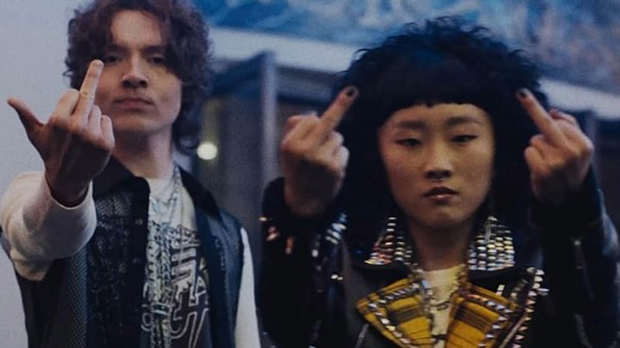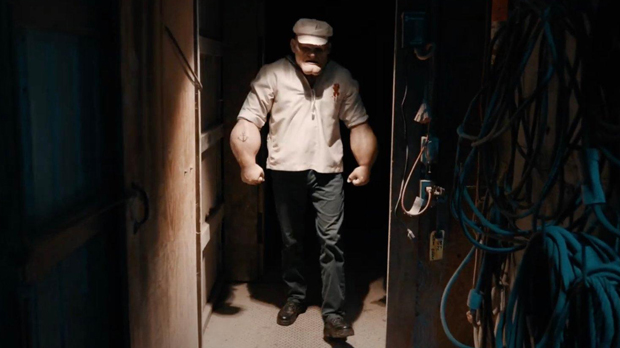 Rooftops (1989) New Visions/Drama-Musical RT: 98 minutes Rated R (language, violence, brief nudity and sexual content, drugs) Director: Robert Wise Screenplay: Allan A. Goldstein and Tony Mark Music: Michael Kamen and David A. Stewart Cinematography: Theo van de Sande Release date: March 17, 1989 (US) Cast: Jason Gedrick, Troy Beyer, Eddie Velez, Tisha Campbell, Alexis Cruz, Allen Payne, Steve Love, Rafael Baez, Jamie Tirelli, Luis Guzman, Millie Tirelli, Robert LaSardo, Jay M. Boryea, Rockets Redglare, Edouard DeSoto, John Canada Terrell, Bruce Smolanoff, Edythe Jason. Box Office: $2M (US)
Rooftops (1989) New Visions/Drama-Musical RT: 98 minutes Rated R (language, violence, brief nudity and sexual content, drugs) Director: Robert Wise Screenplay: Allan A. Goldstein and Tony Mark Music: Michael Kamen and David A. Stewart Cinematography: Theo van de Sande Release date: March 17, 1989 (US) Cast: Jason Gedrick, Troy Beyer, Eddie Velez, Tisha Campbell, Alexis Cruz, Allen Payne, Steve Love, Rafael Baez, Jamie Tirelli, Luis Guzman, Millie Tirelli, Robert LaSardo, Jay M. Boryea, Rockets Redglare, Edouard DeSoto, John Canada Terrell, Bruce Smolanoff, Edythe Jason. Box Office: $2M (US)
Rating: ***
The Day the Earth Stood Still. West Side Story. The Haunting. The Sound of Music. Star Trek: The Motion Picture. These are the titles most likely to come to mind first when thinking of Robert Wise. His directorial career spanned over five decades starting with 1944’s The Curse of the Cat People. Prior to that, he worked as an editor on Citizen Kane and The Magnificent Ambersons, among other films. He achieved critical acclaim in a variety of genres including sci-fi, western, horror, film noir, drama and musical. His drive for perfection is present in each of his films even if the finished product was less than perfect. Sadly, that’s the case with his theatrical swan song, the 1989 drama Rooftops.
For some reason, a line from Walt Whitman’s poem Song of Myself comes to mind whenever I think of this movie- “I sound my barbaric yawp over the roofs of the world”. I know there’s no connection, direct or indirect, between the two things. If anything, I should be thinking of Dead Poets Society when I hear that line. Isn’t it funny what the mind can do? In any event, it’s hardly fair to compare Rooftops to a Whitman poem. The works of the “Father of Free Verse” is still taught in lit classes; hardly anybody remembers Wise’s final film.
Well, I certainly remember Rooftops. I saw it at the movies way, way back in spring ’89. I went by myself because I couldn’t find anyone else who wanted to see it. I thought it was just okay at the time. I watched it a second time about a year later and that’s the last I saw of it until I found it on Tubi this past week. I thought it would be fun to revisit it after 30+ years and I was right. I had a blast watching this gigantic slice of 80s cheese.
From the start, it’s clear Wise is trying to make an 80s version of West Side Story with Rooftops. It is, in part, about a romance between two young people from different worlds. T (Gedrick, Iron Eagle) is a white guy who lives in a water tower on the roof of an abandoned building in New York’s Lower East Side. He makes a living selling scrap metal he salvages from the buildings. He’s also the local champ of “combat dancing”, a crude variation of Brazilian Capoeira. One night, he spots Elena (Beyer, Disorderlies) in the crowd at a dance-off. Their meet-cute is one for the books; she accidentally kicks him in the balls when he tries to save her from a horny wino. It doesn’t take long for them to fall for each other.
Now as we all know, no great romance is without a complication or two. This one’s a real doozy. Elena happens to be the cousin of Lobo (Velez, Repo Man), a drug-dealing pimp trying to take over the neighborhood. That means chasing out all the homeless teens living on the rooftops. She works for him as a lookout, but only so she can take care of her family while her father recovers from a heart attack. Naturally, Lobo doesn’t want them to be together and takes measures to ensure T gets the message loud and clear.
Okay, let’s do some inventory…. of genres, that is. Rooftops is, at once, a crime thriller, a love story, a dance picture and a gritty look at homeless teens in an urban setting. It struggles to find an identity, but never settles on one resulting in a markedly uneven movie. None of it is fully developed. I’m talking both plot and characters. We literally know nothing of T’s past until late in the game when he opens up to Elena about being orphaned at the age of six. Then nothing. What happened between then and now? When exactly did he take to the streets? The only character who gets any significant attention is Squeak (Cruz, Stargate), a 15YO graffiti artist thrown out of his home by his mother’s abusive boyfriend. He’s kind of the comic relief with the way he hangs around and makes a pest of himself. The opening sequence shows him running from a gang of thugs through the streets and across rooftops until T saves his ass in a way that foreshadows the climax. Now that I think about it, Elena isn’t all that one-dimensional either. We know she’s torn between her feelings for T and family loyalty. Ah, so very West Side Story except these kids don’t break into song.
The drug gang angle is simplistic at best. Essentially, Lobo and his goons routinely clear derelict buildings of squatters before setting up their crack-dealing operations. They threaten, intimidate and assault T and his friends. In one instance, they throw somebody out a window to his death. What I want to know is who’s behind the operation? Is there a boss or something? If not, what’s stopping others from fighting back? Other than guns, that is. I suppose it’s best not to ask such questions, especially since any attempt at realism in undermined by the film’s musical aspect. This part relies on clichés seen in any given breakdance flick of the era, the two Breakin’ movies in particular. It makes Rooftops feel more like a fantasy. That is, until Lobo and his goons start waving their guns around again.
ANYWAY, even if the whole combat dancing subplot feels a bit out of place, Rooftops does have a decent soundtrack. Of course, the same could be said of most 80s movies, but this particular soundtrack didn’t produce a single #1 hit. It bombed as badly as the movie itself. Too bad, there are some pretty good tunes on it. The opening chase is set to “Avenue D” by Etta James (w/David A. Stewart of The Eurythmics). The title track by Jeffrey Osbourne is pretty great. The dance numbers, especially the one that closes the movie, are lively and energetic.
The acting in Rooftops isn’t especially good; Gedrick, in particular, doesn’t ring true as a teen living on the streets. Is he even supposed to be a teen? He seems older than the others. Beyer is an absolute cutie! She’s endearing and she can act. Cruz is very good as Squeak. Velez projects an air of menace as the main antagonist.
What’s really cool about Rooftops now is how it perfectly captures a time and place, pre-gentrification Lower East Side. Before the developers and yuppies took over, it was a decaying, dangerous place populated by addicts, dealers, gangs and poor people who couldn’t afford to live elsewhere. It wasn’t safe to walk the streets at night or during the day either. Looking at it now, it has its own unique beauty. Sure, Wise sugarcoats things a bit by not dwelling on the crack epidemic and junkies looking for a fix. He tries to create fantasy out of a bleak reality and succeeds in a strange way. He was a gifted filmmaker who always put forth effort in every one of his cinematic endeavors. Rooftops might not be on the same level as most (if not all) of his other movies, but it’s a damn good try on his part. It’s not his fault the screenplay by Allan A. Goldstein and Tony Mark is half-baked. It’s surprisingly underdeveloped. That’s okay though, it makes for a fun albeit messy guilty pleasure. Now if you’ll excuse me, I have to go sound my own barbaric yawp from a rooftop somewhere. Sorry, I couldn’t resist.
